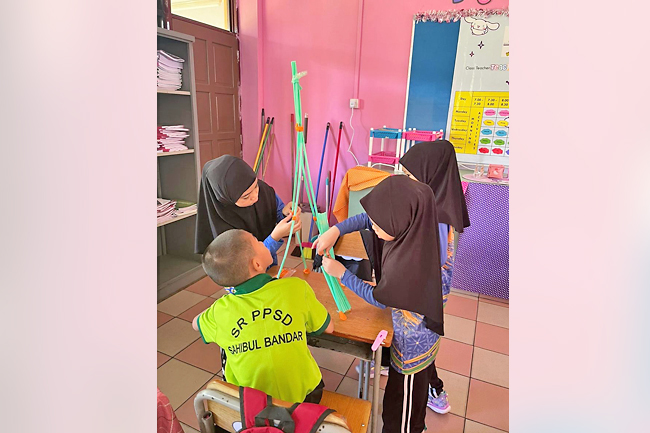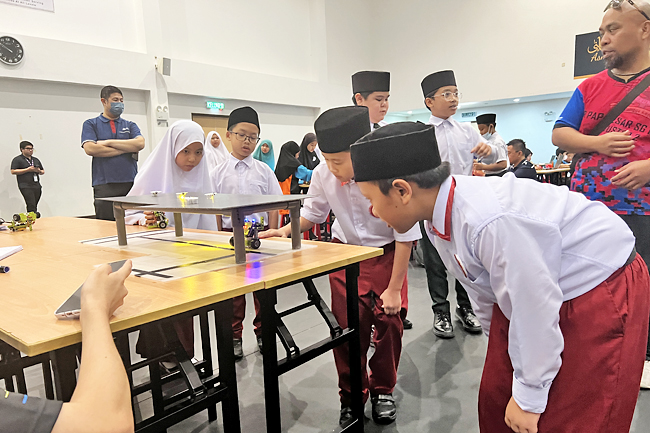Brought to you by

In an era of rapid global change, STEAM education – encompassing science, technology, engineering, arts and mathematics – has become increasingly essential.
More than just a method of imparting knowledge, STEAM fosters critical thinking, creativity and adaptability, all of which are crucial for addressing the complex challenges of the modern world.
In Brunei Darussalam, STEAM teachers are instrumental in this educational transformation, skilfully balancing the diverse subjects within STEAM while providing students with a comprehensive and meaningful learning experience that equips them to navigate an ever- evolving future.
For Siti Saralina binti Mohd Azize, a STEAM teacher from Lambak Kanan Jalan 49 Primary School, STEAM education in the Sultanate “has evolved from a focus on separate subjects to an integrated approach that emphasises collaboration and creativity”.
“I help students see real-world applications by incorporating project-based learning that addresses current global issues, such as climate change or a variety of environmental problems.”
By its very nature, STEAM education is designed to complement each subject, teaching students to harness both critical thinking and creativity to address a challenge.


“While studying a passage about a lighthouse, we might analyse the historical context (history), create visual representations (art), and even model structures mentioned in the story (engineering), and integrate a hands-on building project, where they had to create their own lighthouse with minimal necessary resources.”
This approach, she said, ensures students engage with each discipline meaningfully, fostering a more holistic understanding of the material.
Collaboration plays a key role in enhancing STEAM education, even at the primary level.
Teachers like Siti Saralina foster teamwork through activities such as collaborative design thinking, where students work in diverse teams to solve real-world problems, leveraging strengths from different subjects.
Meanwhile, at Paduka Seri Begawan Sultan Science College (MSPSBS), one of Brunei’s leading academic institutions, education has evolved from traditional STEM to an integrated STEAM approach.
“Initially rooted in traditional STEM, the school has embraced an interdisciplinary, hands-on learning model that integrates science, technology, engineering, arts, and mathematics,” the school shared.
The MS STEAM Showcase underscores MSPSBS’ commitment to practical applications of STEAM education, engaging students with both local and global issues.
Launched in 2023 for Year 7 students, the showcase expanded in August 2024 to encompass all levels, from Year 7 to pre-university.
The event featured a range of student-led projects that demonstrated creativity, innovation, and problem-solving skills, with each year level focusing on themes such as Young Scientist, Young Game Creator, Young Engineers and Sustainable Living, aligned with the United Nations (UN) Sustainable Development Goals.
A key aspect of this STEAM education is project-based learning (PBL), where students collaboratively address real-world issues like sustainable urban design.
This method utilises diverse strengths in science, design, communication, and technology, equipping students to tackle pressing global challenges such as climate change and renewable energy, thereby enhancing their innovative problem-solving skills.
In 2023, the school was honoured as the ‘Most Active School in STEAM’ by the Science, Technology, Environment and Partnership (STEP) Centre at the Ministry of Education, the authority of STEAM Education in Brunei.
The school also implements Peer Teaching and Cross-Age Mentoring, where older students guide younger peers in STEAM projects, promoting collaboration and learning.
“Peer teaching allows students to reinforce their understanding by explaining concepts to others, such as coding, science, and design, while also fostering leadership and communication skills.”
MSPSBS places strong emphasis on integrating the arts into its STEAM curriculum.
For instance, in robotics projects, students not only build and programme their robots but also focus on design elements, ensuring that creativity plays a crucial role in the engineering process.
This holistic approach nurtures innovative thinking and highlights the arts’ essential contribution to technological advancement.
By incorporating artistic principles, students develop a comprehensive skill set that prepares them for complex challenges in their future careers.
MSPSBS STEAM educators Dr Haji Makarimi bin Haji Awang Kasim and Haji Eddy Masirwan bin Haji Dolah noted that the college also focuses on making STEAM education more inclusive and equitable.
They emphasised fostering collaboration, where every student’s strengths contribute to collective success.
“Initiatives that promote diversity in STEAM encourage participation from a broader range of students, ensuring that individuals from various backgrounds and skill sets have opportunities to shine,” they explained.
A critical aspect of the school’s success in STEAM education is its utilisation of the latest technologies, continued the educators, who hold titles of STEAM Lower Secondary Level Champion and STEAM Upper Secondary and Pre-University Level Champion, respectively.
“Emerging technologies like 3D printing, virtual reality, robotics, and coding platforms play a critical role in MSPSBS’ STEAM curriculum. These tools bring theoretical concepts to life, giving students the chance to work with cutting-edge innovations.
“We integrate virtual reality (VR) headsets and augmented reality (AR) applications into our lessons, allowing students to explore the solar system, interact with historical landmarks, or examine biological structures.”
They also employ simulation tools like PhET Interactive Simulations and game-based platforms such as Minecraft Education Edition to create interactive learning experiences.
Students at MSPSBS are taught to analyse real-world data using tools like MS Excel, they shared.
By working with actual data sets, they create visualisations and derive insights, which helps them appreciate the relevance of statistics and data analysis in everyday situations.
“By integrating these technologies – 3D printing, coding, VR/AR, simulations, data science, and collaboration tools – into our STEAM lessons, we ensure that students are actively engaged while acquiring the skills required for future challenges and innovations.”


